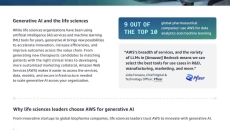Artificial Intelligence
Healthcare operates with the understanding that no system is impenetrable, but must improve incident response practices by finding new ways to stay operational after network attacks, says one panelist at the upcoming HIMSS Cybersecurity Forum.
Its telehealth technology will use the Suki artificial intelligence platform to generate clinical notes to help reduce documentation burden.
E.mersion Studios CEO and creative director David Bolinsky describes how artificial intelligence helps him draw accurate representations of human anatomy – and discusses how image generators’ hallucinations affect scientific illustration.
HIMSS has shifted the focus from adoption to utilisation in the updated version of the Adoption Model for Analytics Maturity, says Chief Relationship Officer Mitch Icenhower.
SPONSORED
In this executive brief, we explore how AWS's generative AI solutions can unlock transformative opportunities for your life sciences organization.
SPONSORED
In today's rapidly evolving life sciences landscape, generative AI is emerging as a game-changing force, poised to drive unprecedented innovation and break through long-standing barriers. At Amazon Web Services (AWS), we understand the immense potential of this transformative technology and offer tailored solutions to help you harness its power.
SPONSORED
What if you could leverage AI to reduce the cost and time to bring a drug to market? What if you could use real-world data to accelerate R&D? What if this was in your reach today?
AI is only as good as the quality of the data, says Sundar Shenbagam, chief technology officer at Edifecs.
BRIDGE – Blueprint for Resilient Integration and Deployment of Guided Excellence – is meant to be an "evidence-based framework that health systems can rely on to not just adopt AI but to help scale it across their operations."
Remote Patient Monitoring
A nurse remote patient monitoring expert explains why she's seeing more providers looking for new tools to help manage CHF – and how advancements in virtual care are allowing more patients to be cared for at home.










